#risks of lithotripsy
Explore tagged Tumblr posts
Link
As ‘breaking’ and ‘stones’ are the meanings of the two Latin syllables of the word ‘Lithotripsy’, one can easily deduce from the knowledge of it being a medical procedure that lithotripsy is a technique for breaking down of stones in organs liver and gallbladder but particularly in kidneys.
#Kidney Stones treatment#Lithotripsy For Kidney Stones#risks of lithotripsy#kidney stone#Kidney Specialist in Ahmedabad
0 notes
Text
Kidney Stone Treatment in Ranchi, Jharkhand from Kidney Specialist
Get your Kidney Stone Treatment in Ranchi at the hands of the best kidney stone specialists in Ranchi, Jharkhand. Open stone surgery, lithotripsy, and ureteroscopy are available for kidney stone removal in our hospital in Ranchi.
#Kidney Stone Diagnosis#Kidney Stone Doctor#Kidney Stone Hospital in Ranchi#Kidney stone risk factors#Kidney Stone Specialist Doctor#Kidney stone symptoms#Kidney Stone Treatment in Ranchi#Kidney Stones#kidney stones form#kidney stones treatment#lithotripsy#Open stone surgery#ureteroscopy
0 notes
Text
Tips for kidney stone treatment
1. Explore the Importance of Hydration: Discuss how increasing water intake can help prevent kidney stones and aid in their treatment, including tips on how to effectively incorporate more fluids into daily routines.
2. Dietary Modifications for Kidney Stone Prevention: Provide an overview of foods to include and avoid in a kidney stone-friendly diet, emphasizing the role of calcium, oxalate, and sodium in stone formation.
3. Lifestyle Changes to Reduce Kidney Stone Recurrence: Highlight practical lifestyle adjustments, such as regular exercise and weight management, that can significantly lower the risk of developing kidney stones in the future.
Consulting a Urologist for Effective Kidney Stone Management
Kidney stones are a common and painful condition that affects millions of people each year
Seeking the expertise of a urologist is crucial for effective treatment and prevention of kidney stones
Understanding Kidney Stones
Definition of kidney stones: Hard deposits made of minerals and salts that form inside the kidneys
Common causes of kidney stones: Dehydration, diet high in certain minerals, family history, underlying medical conditions
Diagnosing Kidney Stones
Role of the urologist in diagnosing kidney stones
Imaging tests used: Abdominal X-ray, CT scan, ultrasound
Analyzing the composition of the stone
Treatment Options Recommended by Urologists
Pain management: Medications to relieve pain and discomfort
Promoting stone passage: Increased fluid intake, medications to relax the ureter
Surgical interventions (if necessary):
Shock wave lithotripsy (SWL)
Ureteroscopy
Percutaneous nephrolithotomy (PCNL)
Importance of Follow-up Care
Monitoring for recurrence of kidney stones
Adjusting treatment plan as needed
Addressing underlying medical conditions
If you are experiencing symptoms of kidney stones, don't hesitate to schedule an appointment with our experienced urologists.
Sandheep Hospital
Address : #96, Palace Road, Near Mahal, Madurai
24/7 Emergency Call : +91 83006 55325
2 notes
·
View notes
Text
PATHOLOGY OF THE URINARY SYSTEM (aka: STUFF WHAT GOES WRONG WITH YER PISS BEANS)
(AND YER PISS TUBES)
(and the pretty pictures I take of them)
[a warning: this post contains radiographic images and non-graphic description of serious kidney pathologies, including paediatric cancer]
Let's kick off with an old familiar friend! Yeah, I'm talking -
UROLITHIASIS (the humble kidney stone!)
Wanna know something horrific? The biggest kidney stone on record weighed over a kilogram. It was 17 cm across. Just. Imagine. Trying to piss that out…
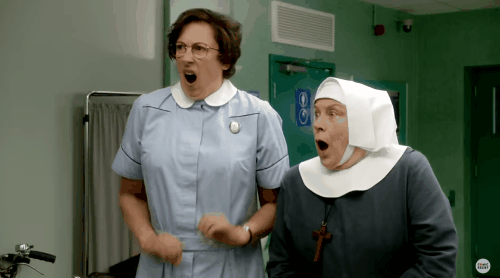
Urolithiases are formed anywhere among your urinary tracts. They’re commonly found in the kidneys, giving rise to the more common term, renal calculi, or kidney stones.
Urolithiasis occurs when compounds within your urine crystallise. If your urine becomes too acidic, too base, contains too many of these compounds for them to remain in solution, or simply… sits around too long without flowing, it literally petrifies into a solid lump!
Some unlucky souls are just… predisposed to developing them. If you have had a kidney stone in the past, you are far more likely to get another one in the future. There also seems to be a genetic link – so if someone in your immediate family gets kidney stones, you have a higher risk.
Kidney stones typically hang out in the pelvis of your kidney and don’t cause an issue. Until you try to piss them out. Remember our kidney diagram (drawn on a conveniently shaped bean)?
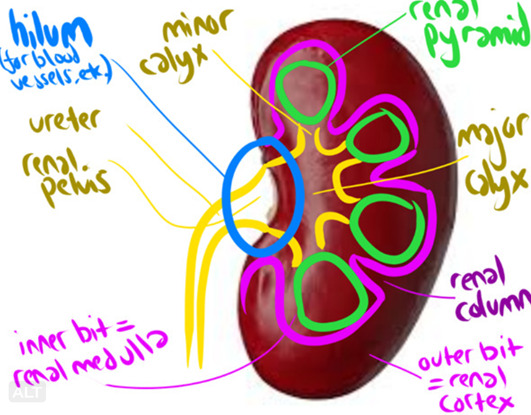
You might notice that the ureters are significantly smaller than the renal pelvis. In other words…

Most renal calculi are made of CALCIUM (oxalate, usually). This is very, very good (for us. Less so for you) because calcium attenuates x-rays – meaning, it glows all pretty and shiny when we take a radiograph!
Here’s a kidney stone on an Abdominal X-Ray!
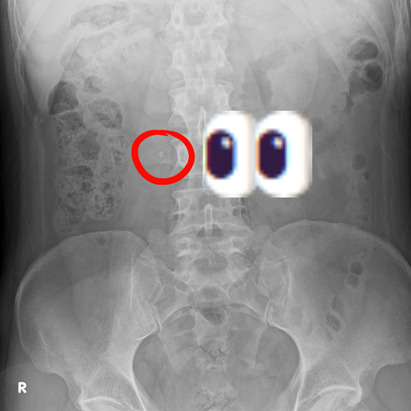
And a twinkly artefact caused by a kidney stone on Ultrasound!
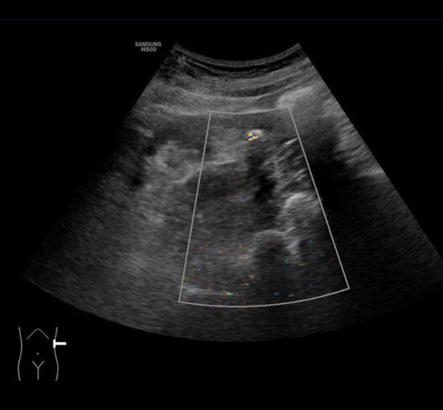
But the best way to assess urolithiases, is, of course, with CT!
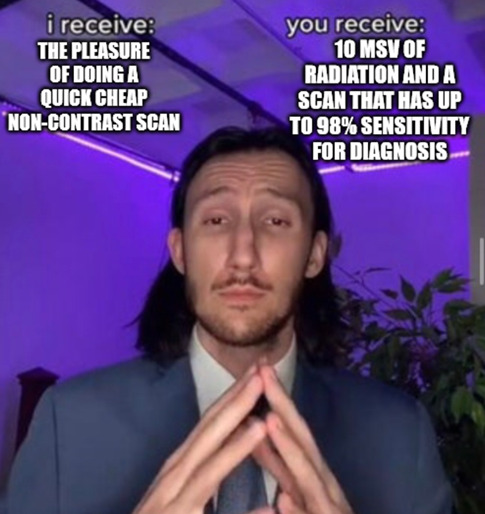
For realsies. We don’t need to inject contrast intravenously, because the kidney stones are (typically) shiny – which cuts down on time and worry, as it means you’re at no risk for having an adverse reaction! So a CT KUB (checking Kidneys, Ureters and Bladder for stones) is basically just a quick tumble in the washing machine (CT scanner), with a lovely clear picture as a result!
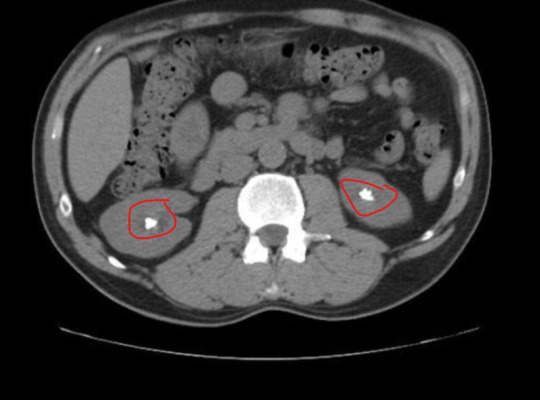
Look at these babies!! So sharp!!! So clear!!!!!! So shiny!!!!!!!!!!!! That’s a beautiful matching pair of renal calculi right there – and to make things better, they’re (currently) non-obstructive, so this patient isn’t in suffering The Agonies!
Speaking of The Agonies…
Most kidney stones are passable, albeit with extreme pain.
However, some ain’t going anywhere. Especially staghorn calculi, which, um. One, stags have antlers. Two…
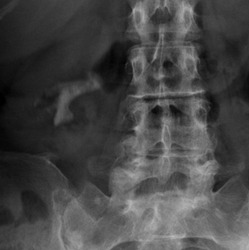
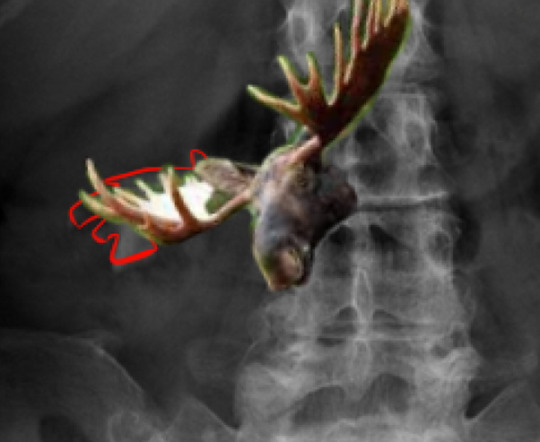
more like a fuckin' MOOSE ANTLER amirite????
But yeah, those buggers aren’t coming out. That’s almost definitely going to require surgery!
Smaller calculi can still cause problems when they become obstructive – i.e., they block the passage of your peepee. They can lead to:
HYDRONEPHROSIS (dilation of the renal pelvis due to retained urine, seen here in the Left kidney [right side of image])
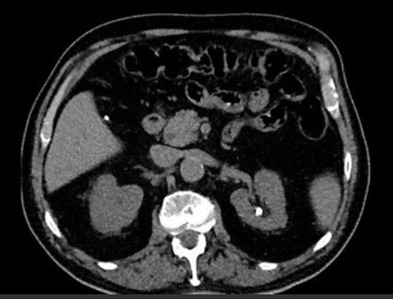
HYDROURETER (dilation of the ureter)
So, what do we do with bothersome calculi? How about some...
EXTRACORPOREAL SHOCKWAVE LITHOTRIPSY (ECSWL, because we love a sexy little acronym here in medworld).
We blast the stone apart with shockwaves, from outside your body! Ultrasound turned up to 11! Unfortunately, it only works on certain densities of stone, and on small stones.
LASER LITHOTRIPSY
(same thing but…. ZIP ZAP LASERZZZZZ]
SURGERY – PERCUTANEOUS NEPHROLITHOTOMY (PCNL).
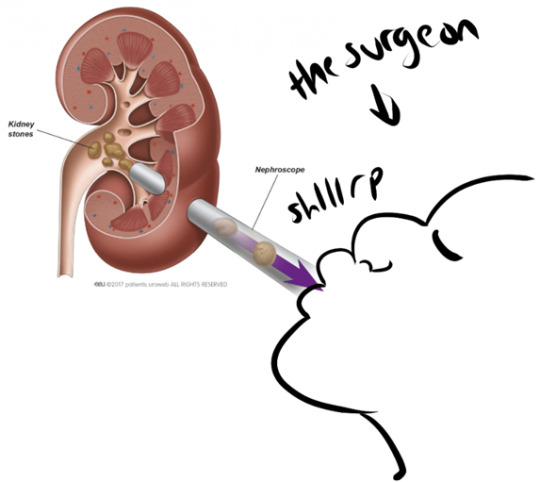
(I totally haven’t added to this diagram in any way. This is how it works. Trust me.)
LOADS of other stuff can go wrong with The Ol’ Piss Beans
We have:
RENAL CELL CARCINOMA
The most common form of kidney cancer.
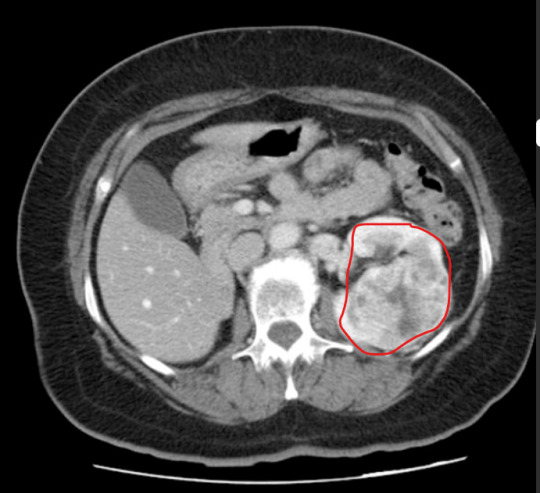
For suspected malignancies, we do a CT Urogram that assesses the whole urinary tract. This takes significantly longer than a KUB, but is well worth the results. This is a three-phase scan. We do...
A regular KUB non-contrast scan to check for calculi and to get our baseline Hounsfield Units ('grayness' and densities) for the kidneys. Then we inject contrast in a 'split bolus' - one load immediately, and another roughly 8 minutes in, scanning roughly a minute after the second injection is given. We scan 80 secs after the first contrast bolus is administrered, for the 'nephographic' phase, which enhances the renal cortex & medulla, and makes neoplastic changes and renal masses obvious (see image above). Then we wait 10-ish minutes and scan for the 'excretory' phase, after the contrast has worked its way through your kidneys, to detect 'filling defects' (anything that stops contrast opacification of the ureters) and pathologies related to the urinary collection system.
NEPHROBLASTOMA
This is one of the more common cancers found in kids. Although paediatric cancer is never exactly a happy topic, this cancer is now curable in roughly 90% of cases, thanks to the early removal of kidneys and the possibility of transplants.
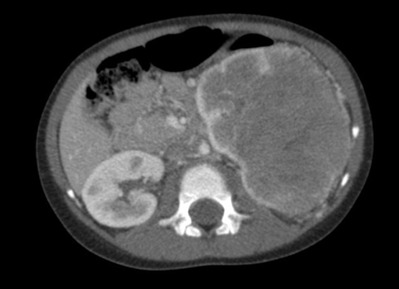
Autosomal Dominant (and Recessive) Polycystic Kidney Disease
An inherited renal disease that can cause you to go into End Stage Renal Failure due to the healthy tissue in your kidneys becoming completely overtaken by cysts. As a result, your kidneys can grow more and more, until they practically fill your whole abdomen. 45% of patients will be in ESRF and need dialysis by the age of 60. Thankfully, transplants are an option.
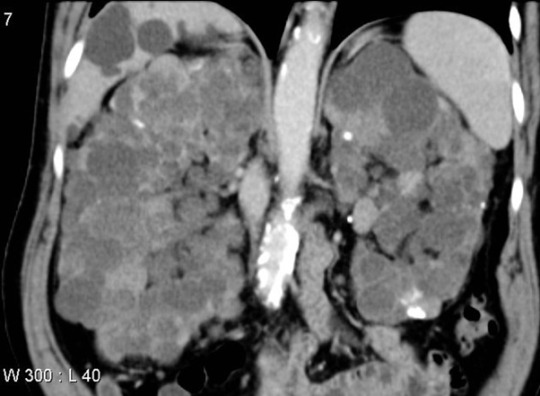
Other commonly encounutered renal pathologies include trauma, which I talked about in my first kidney ramble (linked here!), infections, and more.
I hope you enjoyed this whistle-stop tour of Stuff That Can Go Wrong With The Kidney, And How We Look At Them Gnarly Beans!
....And, um, I spent way too long making this and now need to pee. This is your reminder to go empty that bladder if you need to! Stop those stones!
16 notes
·
View notes
Text
Laser Treatment for Kidney Stones in India: What You Need to Know
Laser treatment for kidney stones, also known as lithotripsy, is a non-invasive procedure that uses a laser to break up large kidney stones into smaller fragments. This treatment offers several advantages over traditional surgical methods, including faster recovery, reduced complications, high success rates, and minimal pain and discomfort. In India, laser treatment for kidney stones is widely available and has made the country a popular destination for medical tourism.
The procedure involves inserting a laser through a small incision into the ureter, targeting the stone with high-energy pulses to break it into smaller pieces. The patient is typically under general anesthesia during the procedure, which takes about an hour to complete. After a few hours of monitoring, patients are discharged and can resume normal activities within a few days.
India boasts advanced medical facilities and highly skilled professionals trained to perform this procedure with precision and care. Additionally, the cost of laser treatment for kidney stones in India is significantly lower than in many other countries, making it an affordable option for patients seeking quality medical care.
While the procedure carries some risks such as bleeding, infection, urinary tract injury, residual stone fragments, and obstruction, these complications are rare and can be managed with proper medical care.
After the procedure, patients are advised to stay hydrated, take prescribed pain medication if necessary, follow a healthy diet, and adhere to their doctor's instructions for post-procedure care.
In conclusion, laser treatment for kidney stones is a safe and effective procedure available in India, offering patients a quick and comfortable recovery. With its advanced medical facilities and affordability, India has become a popular destination for individuals seeking this treatment. know more click here
#health and wellness#healthtrip#healthcare#health#treatment#wellness#laser treatment#laser therapy#kidney stone#kidney function test#kidney cancer
2 notes
·
View notes
Text
Kidney Stones Treatment in Chennai
Kidney stones can be a painful and challenging condition, but advanced medical care offers hope for effective treatment. At Sunway Medical Centre, we specialize in state-of-the-art kidney stone treatments, ensuring a quick and comfortable recovery. With a team of experienced urologists and the latest technology, we provide personalized solutions to help patients find relief and prevent recurrence.

Understanding Kidney Stones
What is a Kidney Stone?
A kidney stone is a hard deposit of minerals and salts that forms inside the kidneys. These stones vary in size and composition, and they can sometimes block the urinary tract, causing severe pain and discomfort. If not treated promptly, kidney stones can lead to complications such as infections or kidney damage.
Key Takeaways:
Kidney stones develop due to high mineral concentration in the urine.
They can block urine flow, leading to pain and health complications.
Individuals aged 30-50 years are at higher risk of developing kidney stones.
Understanding their causes and symptoms helps in early diagnosis and treatment.
Causes of Kidney Stones
Several factors contribute to kidney stone formation, including:
Dehydration – Low water intake leads to concentrated urine, increasing the risk of stone formation.
Diet – A high intake of salt, sugar, and animal protein can trigger stone development.
Medical Conditions – Chronic illnesses such as diabetes, gout, or obesity may contribute to stone formation.
Genetics – A family history of kidney stones increases susceptibility.
Medications – Certain medicines, including diuretics and calcium supplements, can promote stone development.
Prevention Tips:
Drink plenty of water (at least 2-3 liters daily).
Reduce salt and protein intake.
Consume foods rich in calcium and citrate (e.g., dairy products, lemon juice).
Stay physically active to maintain a healthy body weight.
Signs and Symptoms
Kidney stones can present with various symptoms depending on their size and location. Common symptoms include:
Severe pain in the back, side, or lower abdomen.
Pain during urination (burning sensation or discomfort).
Blood in the urine (pink, red, or brown discoloration).
Nausea and vomiting due to pain.
Frequent urination or difficulty passing urine.
Cloudy or foul-smelling urine in some cases.
If you experience these symptoms, consult Sunway Medical Centre for immediate diagnosis and kidney stone treatment in Chennai to prevent further complications.
Types of Kidney Stones
Understanding the type of kidney stone helps determine the best treatment approach:
Calcium Stones – The most common type, usually composed of calcium oxalate or calcium phosphate.
Uric Acid Stones – Found in individuals with high-protein diets or gout.
Struvite Stones – Develop due to urinary tract infections (UTIs) and tend to grow rapidly.
Cystine Stones – A rare type caused by a genetic disorder leading to excess cystine in the urine.
Proper diagnosis and identification of the stone type are crucial for an effective treatment plan.
Kidney Stones Treatment in Chennai
At Sunway Medical Centre, we offer comprehensive treatment options based on the size, type, and location of the kidney stones. Our goal is to provide minimally invasive procedures for a quicker and pain-free recovery.
Treatment Options:
Medications – For small stones, medications may help dissolve them naturally. Pain relievers are also prescribed to manage discomfort.
Extracorporeal Shock Wave Lithotripsy (ESWL) – A non-invasive procedure using shock waves to break stones into smaller fragments for natural passage.
Ureteroscopy – A minimally invasive method using a thin scope to remove or break stones located in the ureter or kidney.
Percutaneous Nephrolithotomy (PCNL) – A surgical procedure used for large or complex stones.
Kidney Stone Laser Treatment in Chennai – Advanced laser technology ensures precise and painless stone removal.
Kidney Stone Laser Treatment and Cost
Kidney Stone Laser Treatment in Chennai
Laser treatment is an innovative method for kidney stone removal. This procedure utilizes a laser to break the stone into small fragments, making it easier to pass or remove.
Benefits of Laser Treatment:
Minimally invasive with faster recovery time.
Reduced risk of complications such as infections.
Effective for both small and large stones, ensuring precise removal.
Kidney Stone Laser Treatment Cost in Chennai
The cost of laser treatment varies based on several factors, including:
Size and type of kidney stone.
Diagnostic tests (ultrasound, CT scan, urine analysis, etc.).
Hospital stay and aftercare requirements.
At Sunway Medical Centre, we offer affordable and transparent pricing for kidney stone laser treatment cost in Chennai, making high-quality care accessible to all patients.
When is Kidney Stone Removal Necessary?
Certain conditions require immediate kidney stone removal:
Severe pain that does not improve with medications.
Large stones that cannot pass naturally.
Recurrent infections caused by kidney stones.
Obstruction of urine flow, which may lead to kidney damage.
Our state-of-the-art facilities ensure effective and safe kidney stone removal in Chennai.
Diagnosis of Kidney Stones
Early diagnosis helps in effective treatment and preventing complications. Our diagnostic tests include:
Imaging Tests – X-rays, ultrasounds, or CT scans to detect stone size and location.
Urine Tests – Identifies crystal-forming substances in the urine.
Blood Tests – Checks for high calcium, uric acid, or other substances linked to stone formation.
Prevention Strategies
Preventing kidney stones involves making lifestyle changes to maintain overall kidney health:
Stay Hydrated – Drink at least 2-3 liters of water daily.
Limit Salt and Protein – Reduce sodium and moderate protein intake.
Consume Calcium-Rich Foods – Prevents oxalate absorption, reducing stone formation.
Monitor Oxalate Levels – Limit foods like spinach, beets, and chocolate.
Stay Active – Regular exercise maintains a healthy body weight, reducing risk factors.
Consult our specialists at Sunway Medical Centre for a personalized prevention plan tailored to your health needs.
Conclusion
When it comes to kidney stones treatment in Chennai, Sunway Medical Centre is a trusted choice for comprehensive care. With expert urologists, cutting-edge technology, and patient-centered services, we ensure a hassle-free experience for all individuals suffering from kidney stones. From accurate diagnosis to advanced treatments like kidney stone laser treatment in Chennai, we prioritize your health and comfort. If you are looking for affordable kidney stone laser treatment cost in Chennai, book a consultation today and let us help you achieve a pain-free recovery. For more details visit https://sunwaymedicalcentre.in/best-urologist-in-chennai/
0 notes
Text

Kidney Stones Treatment in Hisar at Guru Jambheshwar Multispeciality Hospital
Kidney stones can cause severe pain and discomfort, affecting daily life and overall well-being. If you are looking for the best kidney stone treatment in Hisar, Guru Jambheshwar Multispeciality Hospital is your trusted healthcare provider. With advanced medical technology, experienced urologists, and personalized patient care, the hospital ensures effective and minimally invasive treatments for kidney stones.
Why Choose Guru Jambheshwar Multispeciality Hospital for Kidney Stone Treatment?
1. Expert Urologists and Nephrologists
The hospital has a team of highly skilled and experienced urologists and nephrologists who specialize in diagnosing and treating kidney stones with precision. Their expertise ensures optimal patient care and successful outcomes.
2. Advanced Diagnostic Facilities
Accurate diagnosis is crucial for effective treatment. The hospital offers advanced diagnostic tests, including:
Ultrasound and CT Scan: To detect the size and location of kidney stones.
Urine and Blood Tests: To analyze underlying causes and prevent recurrence.
IVP (Intravenous Pyelogram): A specialized imaging test for detailed kidney assessment.
3. Comprehensive Treatment Options
Guru Jambheshwar Multispeciality Hospital provides a wide range of kidney stone treatments, including:
Medical Management: Small stones can be treated with medications, hydration, and dietary changes.
Extracorporeal Shock Wave Lithotripsy (ESWL): A non-invasive procedure that uses shock waves to break kidney stones into smaller fragments for easy passage.
Ureteroscopy (URS): A minimally invasive procedure where a thin scope is inserted to remove or break stones using laser technology.
Percutaneous Nephrolithotomy (PCNL): A surgical procedure for larger kidney stones that cannot pass naturally.
Laparoscopic and Open Surgery: For complex cases requiring direct stone removal.
4. Minimally Invasive and Painless Procedures
The hospital focuses on minimally invasive techniques that ensure:
Faster recovery and shorter hospital stays.
Reduced pain and minimal scarring.
Lower risk of complications and infections.
5. Affordable and Transparent Treatment Costs
Guru Jambheshwar Multispeciality Hospital provides high-quality kidney stone treatments at affordable rates. The hospital follows a transparent pricing policy, ensuring patients are informed about their treatment costs without hidden charges.
6. Preventive Care and Lifestyle Guidance
Preventing kidney stones is as important as treating them. The hospital offers expert guidance on:
Hydration and dietary changes to reduce stone formation.
Identifying risk factors and lifestyle modifications.
Regular follow-ups to prevent recurrence.
7. Emergency and 24/7 Support
Kidney stone pain can be unbearable, requiring immediate medical attention. The hospital offers 24/7 emergency care to provide prompt treatment and pain management.
Conclusion
For the best Kidney stone treatment in Hisar, Guru Jambheshwar Multispeciality Hospital stands as a leading healthcare provider. With state-of-the-art technology, expert urologists, and patient-centric care, the hospital ensures effective and pain-free kidney stone treatments. Book a consultation today and take the first step towards a stone-free, healthier life.
Visit us at: Agroha, Hisar, Haryana Call us today to book your session: +91 896 866 8079
0 notes
Text
Ureteral Stones & Urethral Care Treatment: Symptoms, Causes, Diagnosis, and Treatment

Ureteral stones are kidney stones that travel down into the ureter, potentially causing severe pain and urinary obstruction. The size and composition of these stones differ; smaller ones may pass independently, whereas larger ones might need medical treatment. At Desai Surgical Hospital, we specialize in diagnosing and treating ureteral stones with advanced techniques to ensure optimal patient care.
Symptoms of Ureteral Stones
The presence of ureteral stones can lead to a range of symptoms, including:
Severe Flank Pain: Sudden, intense pain in the lower back or sides, often radiating to the groin.
Painful Urination: Burning sensation or discomfort while urinating.
Hematuria (Blood in Urine): Pink, red, or brown-colored urine.
Frequent Urination: Increased urge to urinate, often in small amounts.
Nausea and Vomiting: Accompanying symptoms due to severe pain.
Urinary Tract Infections (UTIs): Fever, chills, and cloudy urine.
If you experience these symptoms, immediate medical attention is advised to prevent complications.
Causes and Risk Factors
Several factors contribute to the formation of ureteral stones, including:
Dehydration: Lack of adequate fluid intake causes urine to become darker and more concentrated.
Dietary Habits: High consumption of oxalate-rich foods (spinach, nuts, chocolate) and excessive salt intake.
Genetic Predisposition: Having a family history of kidney stones increases the risk.
Obesity: Metabolic imbalances leading to stone formation.
Medical Conditions: Conditions such as hyperparathyroidism and urinary tract infections.
Diagnosis of Ureteral Stones
Early diagnosis ensures prompt and effective treatment. Standard diagnostic methods include:
Urinalysis: Identifies blood, infection, or stone-forming substances.
Ultrasound: Detects the presence and size of stones non-invasively.
CT Scan (Computed Tomography): A detailed view of the urinary tract and stone location is provided.
X-ray (KUB - Kidney, Ureter, and Bladder): Determines stone size and position.
Treatment for Ureteral Stones
The treatment method varies based on the size, location, and severity of the stones:
Non-Invasive Treatments
Hydration & Pain Management: Encouraging increased water intake to facilitate stone passage while using pain relief medications.
Medications: Alpha-blockers may be prescribed to relax the ureter, aiding stone movement.
Minimally Invasive Procedures
Shock Wave Lithotripsy (SWL) Uses sound waves to break stones into smaller fragments, allowing them to pass naturally.
Ureteroscopy (URS): A thin, flexible scope is inserted through the urethra to remove or break the stone.
Surgical Interventions
Percutaneous Nephrolithotomy (PCNL): Used for more extensive or complex stones; involves a small incision to remove the stone directly.
Preventing Ureteral Stones
Preventing recurrence is key to long-term urethral health:
Increase Fluid Intake: Drinking at least 2-3 liters of water daily.
Dietary Modifications: Reducing salt, oxalate, and animal protein intake.
Medications: Prescribed in specific cases to prevent new stone formation.
Regular Follow-ups: Monitoring urinary health and stone recurrence risk.
Expert Urological Care at Desai Surgical Hospital
Our expert team, led by Dr. Jitendra Desai and Dr. Malhar Patel, provides advanced treatments for ureteral stones and comprehensive urological care. Our patient-centric approach ensures effective diagnosis, personalized treatment, and long-term management strategies.
Contact Us
If you're experiencing symptoms or need consultation for ureteral stones, visit Desai Surgical Hospital for expert care.
Address: Desai Surgical & Eye Hospital, Near G.P.O Kharivav Road, Dandia Bazaar Rd, Raopura, Vadodara, Gujarat 390001
Phone: 0265 2435153
Email: [email protected]
Follow Us:
Facebook | Instagram | YouTube
0 notes
Text
Can Dehydration Lead to Kidney Stones? The Truth Explained
Kidney stones are a painful reality for many, but did you know that dehydration is one of the leading causes? If you're not drinking enough water, you might be putting yourself at risk without realizing it. This blog will dive deep into what causes kidney stones, their symptoms, and the best treatment options.

What Causes Kidney Stones?
Kidney stones form when minerals and salts crystallize in your kidneys. Dehydration plays a crucial role in this process because
Less water means higher concentrations of minerals like calcium and oxalate.
These minerals crystallize and form stones instead of being flushed out.
Over time, the rocks grow larger and cause painful symptoms.
Other factors contributing to kidney stones include: ✅ A high-sodium diet ✅ Excessive consumption of oxalate-rich foods (like spinach, nuts, and chocolate) ✅ Family history of kidney stones ✅ Obesity and metabolic disorders
Kidney Stone Symptoms: When to See a Urologist
Kidney stones can range from tiny grains to large, painful masses. Symptoms include: 🔹 Severe pain in the lower back or abdomen 🔹 Blood in urine 🔹 Frequent and painful urination 🔹 Nausea and vomiting 🔹 Cloudy or foul-smelling urine
If you're experiencing any of these, it's time to consult a urologist. Delaying treatment can lead to complications like kidney infections or blockages.
Kidney Stones Treatment: What Are Your Options?
The treatment for kidney stones depends on their size and severity: ✔ Small Stones: Can often be passed naturally by increasing water intake and taking pain relievers. ✔ Larger Stones: May require medical intervention, including:
Extracorporeal Shock Wave Lithotripsy (ESWL) – Breaks stones into smaller fragments.
Ureteroscopy – A small scope removes or breaks the stone.
Surgical removal for severe cases.
Preventing Kidney Stones: Stay Hydrated!
The easiest way to avoid kidney stones is to drink plenty of water. Aim for at least 2.5 to 3 liters daily to keep your urine diluted and prevent mineral buildup.

Need Expert Help? Visit the Best Urologist in Chandigarh at Hale Clinics
Suppose you suspect you have kidney stones or any other urological issue. In that case, Hale Clinics offers expert care with advanced diagnosis and treatment options. Our specialists ensure you receive the best treatment, focusing on long-term prevention.
Book an appointment with the leading urologist in Chandigarh today!
#healthcare#health and wellness#multi speciality clinics in mohali#haleclinics#chandigarh#urologist#kidney stones
0 notes
Text
Detecting Kidney Stones: The Importance of Ultrasound Scans
What Are Kidney Stones? Kidney stones are hard deposits made of minerals and salts that form in the kidneys. They can range from tiny, painless particles to larger stones that cause significant discomfort. This article explains the symptoms, causes, and treatment options for kidney stones, as well as how ultrasound scans aid in their detection.
Symptoms of Kidney Stones Look out for these signs:
Severe pain in the back, sides, or lower abdomen
Blood in the urine or a persistent need to urinate
Nausea, vomiting, or fever
Cloudy or foul-smelling urine, which may indicate an infection
What Causes Kidney Stones? Kidney stones can form due to:
Dehydration: Inadequate water intake leads to concentrated urine, promoting stone formation.
Diet: High consumption of salt, protein, or oxalate-rich foods (like spinach and chocolate) increases risk.
Medical Conditions: UTIs or other health issues can contribute.
Genetics: A family history of kidney stones raises susceptibility.
Medications: Certain drugs, such as antacids, may increase the likelihood of stones.
Treatment Options for Kidney Stones Treatment depends on the stone’s size and location:
Hydration: Drinking plenty of water helps pass small stones naturally.
Pain Relief: Over-the-counter or prescription medications can manage discomfort.
Lithotripsy: Shock waves break larger stones into smaller, passable fragments.
Surgery: Required for stones that cannot be treated with other methods.
How Ultrasound Scans Help Ultrasound scans, such as a Kidneys, Ureters, and Bladder (KUB) Scan or a Kidneys, Bladder, and Prostate Scan, are non-invasive tools that help detect kidney stones. These scans provide detailed images of the urinary tract, aiding in accurate diagnosis and treatment planning. For faster results, consider a private scan to avoid long NHS waiting times.
0 notes
Text
Best Urologist in Dombivli: Quality Care for Your Urological Health
Finding the right urologist is essential when dealing with issues related to the urinary system, kidneys, and male reproductive organs. If you are looking for the best urologist in Dombivli, Samata Hospital is one of the premier healthcare facilities offering specialized care and treatment. Urological health can significantly affect your quality of life, and seeking expert consultation can help you address a wide range of conditions, from urinary tract infections (UTIs) to complex kidney problems and even male infertility.
In this article, we will explore the role of a urologist, the services provided, and why Samata Hospital in Dombivli is an excellent choice for individuals seeking high-quality urological care.
What is Urology?
Urology is a branch of medicine that focuses on the diagnosis, treatment, and prevention of diseases and conditions affecting the urinary tract and male reproductive system. Urologists are specialized doctors who treat disorders of the kidneys, bladder, urethra, prostate, and testicles. They are also experts in handling conditions related to incontinence, infertility, and certain cancers.
Common urological conditions include:
Urinary Tract Infections (UTIs)
Kidney stones
Prostate problems (benign prostatic hyperplasia, prostate cancer)
Male infertility
Bladder cancer
Erectile dysfunction
Incontinence (urinary and fecal)
Vasectomy and vasectomy reversal
A urologist's role extends to both medical and surgical treatments, making them key specialists in a wide range of issues that affect the urinary and reproductive systems.
Services Provided by the Best Urologist in Dombivli
At Samata Hospital in Dombivli, urological care is delivered with expertise, precision, and compassion. The urology department is equipped to handle both common and complex urological conditions with state-of-the-art technology. Some of the services provided by the best urologist in Dombivli include:
1. Comprehensive Urological Diagnosis
An accurate diagnosis is the first step toward effective treatment. A skilled urologist at Samata Hospital will conduct a detailed physical examination, review your medical history, and may recommend diagnostic tests such as urine analysis, blood tests, imaging scans (like ultrasounds, CT scans, or MRIs), and cystoscopy to examine the bladder. These tests help identify the underlying cause of your symptoms and provide a clear path to treatment.
2. Treatment for Urinary Tract Infections (UTIs)
UTIs are one of the most common conditions treated by urologists. Symptoms such as painful urination, frequent urination, and lower abdominal discomfort may indicate an infection in the urinary tract. A urologist can prescribe antibiotics, as well as offer advice on preventive measures, such as hydration and proper hygiene, to reduce the risk of recurrent UTIs.
3. Kidney Stone Management
Kidney stones can cause severe pain and, if left untreated, lead to complications such as kidney damage. The best urologist in Dombivli, such as those at Samata Hospital, offers treatment options like shock wave lithotripsy (SWL) or minimally invasive surgeries to remove or break down the stones. The urologist will also work with you on lifestyle and dietary changes to prevent future kidney stones from forming.
4. Prostate Care
Prostate issues, including benign prostatic hyperplasia (BPH), prostatitis, and prostate cancer, are common in older men. A skilled urologist at Samata Hospital can offer diagnosis and treatment for these conditions, from medications to surgical interventions like prostatectomy or minimally invasive therapies. Early diagnosis and intervention are key to managing prostate problems effectively.
5. Erectile Dysfunction (ED) and Male Infertility Treatment
Erectile dysfunction and male infertility are sensitive topics that many men hesitate to discuss. However, seeking professional care is essential for managing these conditions. Urologists at Samata Hospital offer comprehensive treatments, including oral medications, injections, hormone therapy, and even surgical options for erectile dysfunction. For infertility, diagnostic testing and treatments such as sperm retrieval or varicocelectomy are available.
6. Bladder and Incontinence Care
Incontinence, or the inability to control bladder function, can affect both men and women. Whether caused by aging, childbirth, or neurological conditions, incontinence can significantly impact one’s quality of life. The urologists at Samata Hospital offer medical management, physical therapy, and surgical treatments for bladder issues and incontinence, including pelvic floor exercises, medications, and minimally invasive surgeries.
7. Cancer Treatment and Care
Urologists are also involved in the diagnosis and treatment of cancers affecting the urinary system, including bladder, kidney, and prostate cancer. Early detection is crucial, and urologists at Samata Hospital are equipped with the latest technology for diagnosing and staging cancer. Treatment options, including chemotherapy, radiation therapy, and surgical interventions like cystectomy or nephrectomy, are available.
8. Vasectomy and Vasectomy Reversal
For men considering permanent birth control, a vasectomy is a safe and effective option. Samata Hospital provides expert consultations and procedures for vasectomy. Additionally, if a man decides to reverse the procedure, the urologists at Samata Hospital can perform vasectomy reversal surgeries to restore fertility.
Why Choose Samata Hospital for Urology in Dombivli?
Samata Hospital is one of the leading healthcare institutions in Dombivli, known for its exceptional care in the field of urology. Here’s why it is considered the best option for urological treatments in the area:
1. Expert Urologists
The urology department at Samata Hospital is staffed by experienced and qualified urologists who are experts in their field. With years of training and clinical experience, they provide personalized care tailored to each patient's needs, whether it's for a common condition or a complex issue.
2. Advanced Technology
Samata Hospital is equipped with the latest diagnostic and treatment technologies to provide precise and effective care. From advanced imaging tools to minimally invasive surgical techniques, patients benefit from cutting-edge healthcare solutions.
3. Comprehensive Care
Samata Hospital offers a wide range of services under one roof, from initial consultation and diagnosis to treatment and rehabilitation. Whether you need conservative management or surgical intervention, the urologists at Samata Hospital ensure comprehensive care for your urological health.
4. Patient-Centered Approach
At Samata Hospital, patient care comes first. The hospital takes a compassionate, patient-centered approach, ensuring that you feel comfortable and well-informed at every stage of your treatment. The urologists and medical staff work together to create individualized treatment plans designed for the best possible outcome.
5. Convenient Location
Located in Dombivli, Samata Hospital is easily accessible for residents of the area and surrounding suburbs. With its convenient location and state-of-the-art facilities, it is a leading choice for urological care in the region.
Conclusion
When it comes to finding the best urologist in Dombivli, Samata Hospital is a trusted name that stands out for its expertise, advanced facilities, and patient-focused care. Whether you're dealing with a urinary tract infection, kidney stones, prostate issues, or more complex conditions like cancer or male infertility, the urologists at Samata Hospital are equipped to offer the highest quality of care. If you’re looking for a skilled and compassionate urologist in Dombivli, consider reaching out to Samata Hospital to take the first step towards improving your urological health.
0 notes
Text
Best Center for Kidney Treatment – Advanced Nephrology Care at Preethi Hospitals, Madurai
Understanding Kidney Health: Why It Matters
Kidneys play a vital role in maintaining overall health by filtering toxins, balancing fluids, and regulating blood pressure. With increasing lifestyle disorders and genetic predispositions, kidney diseases are becoming more prevalent. Finding the best center for kidney treatment is crucial for managing and preventing further complications.
Common Kidney Diseases and Their Impact
Kidney ailments range from mild infections to chronic conditions that require long-term management. Some of the most common kidney-related issues include:
Chronic Kidney Disease (CKD): A progressive condition that can lead to kidney failure if untreated.
Kidney Stones: Hard deposits formed from minerals that cause severe pain and block urine flow.
Urinary Tract Infections (UTIs): Recurrent infections can damage the kidneys over time.
Polycystic Kidney Disease (PKD): A genetic disorder that causes cysts in the kidneys, impairing their function.
Kidney Failure: A severe condition requiring dialysis or kidney transplant.
Why Choose Preethi Hospitals, Madurai for Kidney Treatment?
Preethi Hospitals, Madurai, is recognized as one of the best centers for kidney treatment due to its comprehensive approach to nephrology care. The hospital provides state-of-the-art diagnostic tools, advanced treatment methods, and a patient-centric approach.
Advanced Diagnostic Facilities
Early detection is crucial for effective kidney treatment. Preethi Hospitals offers cutting-edge diagnostic tests, including:
Blood and urine tests to assess kidney function
Ultrasound and CT scans for structural analysis
Biopsy procedures for detecting chronic conditions
Expert Nephrology and Urology Care
At Preethi Hospitals, a dedicated team of nephrology specialists and urologists work together to provide personalized treatment plans. The hospital excels in treating both acute and chronic kidney conditions through:
Medical management of kidney disorders
Minimally invasive procedures for kidney stones and UTIs
Dialysis services for end-stage kidney disease
Kidney transplant programs for advanced cases
Cutting-Edge Dialysis Services
For patients with chronic kidney disease, dialysis is a life-saving procedure that helps remove toxins and excess fluids from the body. Preethi Hospitals provides:
Hemodialysis and peritoneal dialysis options
Advanced dialysis machines for effective treatment
Strict infection control measures for patient safety
Minimally Invasive Treatments for Kidney Stones
Kidney stones are a painful and recurring issue for many individuals. At Preethi Hospitals, patients receive advanced treatments like:
Laser Lithotripsy: A non-invasive method that breaks down kidney stones using laser energy.
Shock Wave Lithotripsy (SWL): High-energy sound waves to disintegrate stones for easy passage.
Ureteroscopic Stone Removal: A precise procedure for larger stones that cannot pass naturally.
Comprehensive Kidney Transplant Services
For patients with end-stage renal disease, kidney transplantation is the best solution. Preethi Hospitals offers:
Pre-transplant evaluation and donor matching
Advanced surgical procedures with high success rates
Post-transplant care for long-term health
Lifestyle and Preventive Care for Kidney Health
Maintaining kidney health requires more than just medical treatment. At Preethi Hospitals, patients receive guidance on lifestyle changes to prevent kidney diseases, including:
Hydration: Drinking adequate water to flush out toxins.
Balanced Diet: Reducing salt, sugar, and processed foods to lower the risk of kidney damage.
Regular Exercise: Managing weight and blood pressure to protect kidney function.
Avoiding Unnecessary Medications: Overuse of painkillers can harm the kidneys over time.
Patient-Centric Approach and Holistic Care
Preethi Hospitals prioritizes patient care by offering:
24/7 emergency support for kidney-related conditions
Affordable treatment options for all economic backgrounds
Counseling and rehabilitation services for kidney disease patients
Conclusion: Trust Preethi Hospitals for the Best Kidney Care
If you are searching for the best center for kidney treatment, Preethi Hospitals, Madurai, is a trusted name in nephrology care. With advanced technology, expert medical professionals, and a holistic approach, the hospital ensures the best outcomes for kidney patients.
Prioritize your kidney health today—consult with the experts at Preethi Hospitals for world-class kidney care!

0 notes
Text
Best Ureteroscopy Surgery Hospital in Mira Bhayandar

Introduction
When it comes to addressing urinary tract issues with precision and care, ureteroscopy surgery is a widely preferred solution. Mira Bhayandar has established itself as a prominent healthcare destination, offering cutting-edge medical services at affordable rates. Among the many facilities available, Chirayu Super Speciality Hospital is a standout choice for patients seeking ureteroscopy surgery.
With its state-of-the-art technology, experienced urologists, and commitment to patient-centric care, Chirayu Super Speciality Hospital has gained a reputation as the leading healthcare provider in Mira Bhayandar. In this article, we’ll delve into the features that make Chirayu Super Speciality Hospital the best choice for ureteroscopy surgery.
What is Ureteroscopy?
Ureteroscopy is a minimally invasive procedure designed to diagnose and treat problems within the urinary tract, such as kidney stones, tumors, or blockages. It involves the use of a thin instrument called a ureteroscope, which is inserted into the urethra to access the ureters and kidneys.
Key Uses of Ureteroscopy
Kidney Stones: Removal or fragmentation of stones using advanced laser technology.
Urinary Blockages: Clearing obstructions that impede urine flow.
Tumor Biopsies: Identifying and managing growths in the urinary tract.
Why Choose Mira Bhayandar for Ureteroscopy Surgery?
Mira Bhayandar is home to top-tier healthcare facilities and renowned specialists. Here’s why it stands out:
1. Advanced Medical Infrastructure
Hospitals in Mira Bhayandar are equipped with modern diagnostic and surgical tools to provide precise and effective treatments.
2. Highly Qualified Professionals
Patients benefit from access to experienced and skilled urologists who specialize in ureteroscopy surgery.
3. Cost-Effective Treatment
Compared to other cities, Mira Bhayandar offers affordable medical care without compromising on quality.
Why Chirayu Super Speciality Hospital is the Best Choice
1. Cutting-Edge Technology
Chirayu Super Speciality Hospital leads the way with state-of-the-art medical equipment, including high-definition ureteroscopes and advanced laser lithotripsy systems. These tools enable accurate diagnosis and effective treatment.
2. Experienced Urologists
The hospital’s team of highly skilled urologists has extensive experience in performing ureteroscopy procedures. Their expertise ensures successful outcomes for patients with minimal risks and discomfort.
3. Patient-Centric Approach
Chirayu Super Speciality Hospital prioritizes patient comfort and satisfaction at every step. From pre-surgical consultations to post-operative care, the hospital provides a supportive environment to help patients feel at ease.
4. Comprehensive Care
Patients at Chirayu Super Speciality Hospital receive holistic treatment, including thorough diagnostics, surgical interventions, and detailed recovery plans. The hospital’s multidisciplinary approach ensures that all aspects of a patient’s health are addressed.
5. Transparent and Affordable Pricing
One of the hospital’s key strengths is its cost-effective treatment plans. Chirayu Super Speciality Hospital offers competitive pricing without sacrificing quality, making advanced healthcare accessible to everyone.
Preparing for Ureteroscopy Surgery
Proper preparation ensures a smooth surgical experience. Chirayu Super Speciality Hospital provides patients with clear guidelines to follow before surgery.
Steps to Prepare:
Consultation: Discuss medical history and symptoms with the specialist.
Pre-Surgical Tests: Complete blood tests, imaging scans, and urine analysis.
Dietary Adjustments: Follow dietary restrictions as advised by the doctor.
Medications: Avoid specific medications that may interfere with surgery.
Post-Surgical Care at Chirayu Super Speciality Hospital
The recovery process is an essential part of the treatment, and Chirayu Super Speciality Hospital ensures patients receive exceptional post-operative care.
Post-Surgery Guidelines:
Hydration: Drink plenty of water to aid recovery and flush the urinary system.
Medications: Follow the prescribed pain relievers and antibiotics.
Follow-Up Visits: Attend scheduled appointments to monitor healing progress.
Recovery Benefits at Chirayu Super Speciality Hospital
Dedicated care teams to address any concerns.
Detailed instructions to ensure a smooth recovery.
Access to specialists for follow-up consultations.
Cost of Ureteroscopy Surgery in Mira Bhayandar
One of the reasons Chirayu Super Speciality Hospital is highly recommended is its transparent pricing structure. The cost of ureteroscopy surgery in Mira Bhayandar is significantly lower than in metropolitan areas, making it an attractive option for patients.
Factors Influencing Costs:
Complexity of the Procedure: More advanced cases may require additional interventions.
Use of Advanced Technology: Tools like laser lithotripsy impact the overall cost.
Insurance Coverage: Chirayu Super Speciality Hospital accepts a variety of insurance plans, reducing out-of-pocket expenses for patients.
Testimonials from Chirayu Super Speciality Hospital Patients
Real-life experiences from patients who have undergone ureteroscopy at Chirayu Super Speciality Hospital highlight the exceptional care provided by the hospital.
Patient Stories:
Quick Recovery: "I was back to my normal routine within days of the procedure, thanks to the excellent care at Chirayu Super Speciality Hospital."
Comfortable Experience: "The staff made sure I felt comfortable and informed every step of the way."
Affordable Treatment: "I received top-notch treatment at a fraction of the cost compared to other cities."
Tips for Choosing the Right Ureteroscopy Surgery Hospital
When selecting a hospital for ureteroscopy surgery, consider the following factors:
1. Accreditation and Reputation
Choose a hospital with recognized accreditations and a proven track record, like Chirayu Super Speciality Hospital.
2. Advanced Technology
Ensure the hospital uses modern equipment, such as high-definition ureteroscopes and laser systems.
3. Experienced Specialists
Look for hospitals with skilled urologists who have extensive experience in performing ureteroscopy procedures.
4. Comprehensive Care
Opt for a hospital that offers a complete range of services, from diagnostics to recovery support.
Conclusion
Mira Bhayandar is a growing hub for advanced medical treatments, and for ureteroscopy surgery, Chirayu Super Speciality Hospital stands as the best choice. With its state-of-the-art facilities, skilled medical professionals, and commitment to patient-centric care, the hospital ensures a seamless and effective treatment experience.
Whether you’re dealing with kidney stones, urinary blockages, or other urinary tract issues, Chirayu Super Speciality Hospital offers the expertise and care you need for a quick and smooth recovery. Trust their team of specialists to provide the best ureteroscopy surgery in Mira Bhayandar.
FAQs
1. What is ureteroscopy surgery used for?A: Ureteroscopy is used to diagnose and treat conditions like kidney stones, urinary blockages, and tumors in the urinary tract.
2. Why is Chirayu Super Speciality Hospital recommended for ureteroscopy?A: Chirayu Super Speciality Hospital offers advanced technology, skilled urologists, and patient-focused care, making it the top choice for ureteroscopy surgery.
3. How long does recovery take after ureteroscopy?A: Most patients recover within a few days, though individual recovery times may vary based on health and procedure complexity.
4. What is the cost of ureteroscopy surgery at Chirayu Super Speciality Hospital?A: The hospital offers competitive and transparent pricing, ensuring high-quality care at affordable rates.
5. Is ureteroscopy surgery safe? A: Yes, ureteroscopy is a minimally invasive procedure with low risks. Complications are rare and manageable with proper care.
#Best Ureteroscopy Surgery Hospital in Mira Bhayandar#Best Ureteroscopy Surgery in Mira Bhayandar#Ureteroscopy Surgery#Ureteroscopy
0 notes
Text
Exceptional Urological Care at Venus Hospital: The Best Urology Hospital in Kalyan West
Urological health is a vital aspect of overall well-being, often overlooked until it becomes an issue. At Venus Hospital, we aim to provide world-class urological care tailored to meet every patient’s specific needs. Conveniently located in the heart of Kalyan West, Venus Hospital is recognized as the leading urology hospital in Kalyan West for its advanced treatments, skilled specialists, and compassionate approach.

Comprehensive Urological Services
Venus Hospital offers a wide range of urological services for men, women, and children. From urinary tract infections to complex kidney surgeries, our state-of-the-art facilities ensure accurate diagnoses and effective treatments.
Some of our key services include:
Kidney Stone Management Using advanced techniques like laser lithotripsy and minimally invasive procedures, we ensure swift and effective treatment of kidney stones.
Prostate Treatment Our specialists are adept at diagnosing and managing prostate conditions, including benign prostatic hyperplasia (BPH) and prostate cancer.
Urinary Incontinence We provide tailored treatment plans for urinary incontinence, helping patients regain their confidence and comfort.
Pediatric Urology Children with urological concerns receive the utmost care and attention from our experienced pediatric specialists.
Why Choose Venus Hospital?
Venus Hospital stands out as a premier urology hospital in Kalyan West due to its patient-centric approach and cutting-edge facilities. Here’s why patients trust us:
Expert Team Our urologists are highly qualified with years of experience in treating a variety of urological conditions. They stay updated with the latest advancements in the field to provide the best possible care.
Advanced Technology We utilize the latest diagnostic tools and treatment technologies to ensure precision and efficiency. From high-tech imaging systems to minimally invasive surgical equipment, we leave no stone unturned.
Personalized Care Every patient at Venus Hospital is treated with utmost respect and compassion. We believe in tailoring treatment plans to suit individual needs, ensuring a quick recovery and long-term wellness.
Comfortable Environment A visit to the hospital can be daunting, but our modern infrastructure and friendly staff ensure a comforting experience for patients and their families.
Patient Testimonials
Venus Hospital has earned the trust of countless patients over the years. Here are a few testimonials from those who have benefitted from our services:
"I visited Venus Hospital for kidney stone treatment and was impressed by the professionalism of the doctors and staff. They explained every step of the procedure and made sure I was comfortable throughout." – Rajesh M.
"The team at Venus Hospital helped my father overcome his prostate issues with minimal discomfort. Truly the best urology hospital in Kalyan West!" – Priya S.
Preventive Urology Tips
While Venus Hospital excels in treatment, we also emphasize prevention. Here are a few tips to maintain good urological health:
Stay Hydrated: Drinking plenty of water helps flush out toxins and prevent kidney stones.
Eat a Balanced Diet: Reduce salt intake and eat foods rich in fiber to avoid urological problems.
Regular Check-ups: Early detection is key to effective treatment. Schedule regular health check-ups, especially if you have a family history of urological conditions.
Exercise Regularly: Physical activity helps maintain a healthy weight and reduces the risk of conditions like urinary incontinence.
Conclusion
When it comes to urological health, choosing the right hospital can make all the difference. Venus Hospital, the leading urology hospital in Kalyan West, combines expertise, technology, and compassion to deliver unparalleled care. If you or a loved one is experiencing any urological concerns, don’t hesitate to visit Venus Hospital and experience the best in healthcare.
For appointments or inquiries, contact Venus Hospital today and take the first step towards a healthier you.
0 notes
Text
The Essential Guide to Kidney Stone Treatment: Diagnosis, Causes, and Management Tips

Kidney stones are tiny, solid deposits of minerals and salts that form in your kidneys. While their passage through your body can be intensely painful, some stones may pass unnoticed, without causing any discomfort. For those looking for effective kidney stone treatments in Bahrain, Dr. Das Clinic provides expert care and personalized treatment options to help manage and treat kidney stones.
What are kidney stones and how do they develop?
Your kidneys play a crucial role in eliminating waste and other byproducts from your body. Similar to your liver, think of your kidneys as your body’s natural filtration system.
When you're dehydrated or fail to consume enough water, crystals composed of minerals and salt can develop. As these crystals grow, they draw in additional waste and chemicals, causing the crystal to expand and eventually form a solid mass.
Who can develop a kidney stone?
Unfortunately, anyone can develop a kidney stone, but there are a few risk factors, including:
Being overweight.
Some illnesses also predispose you to a greater risk of development, including polycystic kidney disease and health problems that alter your urine to contain higher concentrations of things like excess calcium or uric acid.
Certain medications can also increase your risk, like calcium-based antacids or diuretics.
Not drinking enough water. While you can get some water through food and even soft drinks, these are by no means what you should use to monitor your water intake.
A family history of kidney stones.
While anyone can get a kidney stone, men are more likely to develop them.
Symptoms include severe pain in your side, lower back pain, burning during urination and blood in your urine.
How to prevent kidney stones
Staying well-hydrated can assist in passing kidney stones, and your doctor may prescribe medication to reduce the acidity of your urine. A balanced diet, regular exercise, and maintaining a healthy weight can also contribute to preventing kidney stones.
Treatments of kidney stones
Of course! Here's a synonym for that content:
Treatment methods depend on the size and quantity of the stones. If your doctor determines that the stones will pass naturally, they may prescribe pain relievers to help ease the discomfort during the process.
Non-invasive options, like shock-wave lithotripsy, are also available, which breaks the stones into smaller fragments that can be passed more easily.
A ureteroscopy may be conducted in more severe cases, where a doctor uses an endoscope to remove the stone. Larger stones may require surgical intervention.
Although kidney stones can be uncomfortable, they are manageable if detected early. Ensure you stay well-hydrated with water and follow your healthcare provider's recommendations regarding medications, especially if you're at a higher risk of developing kidney stones. For those seeking kidney stone treatments in Bahrain, Dr. Das Clinic offers comprehensive care and treatment options tailored to your needs.
0 notes
Text
Gallbladder Stones (Cholelithiasis): Causes, Symptoms, and Treatment Options
Gallbladder stones, also known as cholelithiasis, are hardened deposits that form in the gallbladder. These stones can vary in size, ranging from tiny grains to larger stones, and can lead to discomfort or serious health problems if left untreated. Understanding their causes, symptoms, and treatment options can help individuals take timely action and maintain their overall health. If you’re in Dehradun, seeking advice from a doctor for gallbladder surgeries in Dehradun or a consultant physician in Dehradun can ensure proper care and treatment.

1. What Are Gallbladder Stones?
The gallbladder is a small organ located below the liver, and its primary function is to store bile, a digestive fluid that helps break down fats. Gallstones form when there is an imbalance in the substances that make up bile, such as cholesterol, bile salts, and waste products. These stones can be of two main types:
Cholesterol Stones: Made mostly of hardened cholesterol, they are the most common type.
Pigment Stones: Smaller and darker, these stones are made of excess bilirubin, a substance produced when the body breaks down red blood cells.
2. What Causes Gallbladder Stones?
Several factors can contribute to the formation of gallbladder stones, including:
High Cholesterol Levels in Bile: When bile contains too much cholesterol, it can crystallize and form stones.
Poor Emptying of the Gallbladder: If the gallbladder doesn’t empty completely or often enough, bile becomes concentrated and stones may form.
Excess Bilirubin: Conditions like liver disease or infections in the bile ducts can cause excessive bilirubin production, leading to stone formation.
Diet and Lifestyle: A high-fat, low-fiber diet, rapid weight loss, or obesity can increase the risk of gallstones.
Hormonal Changes: Pregnancy, hormone replacement therapy, or birth control pills can increase cholesterol levels in bile, leading to gallstones.
Family History: Genetics can also play a role in gallstone formation.
3. Common Symptoms of Gallbladder Stones
While some people with gallstones experience no symptoms (a condition known as “silent gallstones”), others may develop noticeable signs when the stones block the bile duct or gallbladder. Symptoms include:
Abdominal Pain: Sudden and sharp pain in the upper right abdomen, often after eating fatty foods.
Nausea and Vomiting: These symptoms often accompany gallbladder pain.
Bloating and Indigestion: Feeling full or gassy after meals is a common complaint.
Fever or Chills: May occur if the gallbladder becomes inflamed or infected.
Jaundice: Yellowing of the skin and eyes, which happens if a stone blocks the bile duct.
If you experience any of these symptoms, especially persistent abdominal pain, it’s essential to consult a doctor for gallbladder surgeries in Dehradun for an accurate diagnosis and timely treatment.
4. How Are Gallbladder Stones Diagnosed?
Gallbladder stones can be diagnosed using the following methods:
Ultrasound: The most common and effective imaging test for detecting gallstones.
CT Scan or MRI: Used to get a detailed view of the gallbladder and bile ducts.
Blood Tests: Help identify infections or complications like blocked bile ducts.
5. Treatment Options for Gallbladder Stones
The treatment for gallbladder stones depends on their size, number, and severity of symptoms. Here are some common approaches:
A. Lifestyle Changes and Monitoring
For silent gallstones that don’t cause symptoms, doctors might recommend regular monitoring and lifestyle changes, such as:
Adopting a healthy, low-fat diet
Staying hydrated
Maintaining a healthy weight
B. Medications
In some cases, medications can help dissolve small gallstones. However, this approach is not always effective for larger stones and may take a long time.
C. Non-Surgical Procedures
Shock Wave Therapy (Lithotripsy): This involves breaking down gallstones into smaller pieces using sound waves. It’s typically used for patients who cannot undergo surgery.
D. Surgery (Cholecystectomy)
Surgical removal of the gallbladder is the most effective treatment for symptomatic gallstones. There are two main types:
Laparoscopic Cholecystectomy: A minimally invasive surgery that involves small incisions and a quick recovery time.
Open Surgery: Required for more complex cases, though it has a longer recovery period.
Also read our blog on Role of Gall Bladder in Digestion and Overall Health
KMC Hospital in Dehradun is known for its expertise in performing gallbladder surgeries in Dehradun with advanced techniques and experienced surgeons.
6. Why Choose KMC Hospital in Dehradun for Gallbladder Treatment?
When it comes to gallbladder care, KMC Hospital stands out for several reasons:
Expert Physicians: The hospital has highly qualified physicians in Dehradun and surgeons specializing in gallbladder treatments.
Advanced Technology: State-of-the-art diagnostic tools and minimally invasive surgical techniques ensure accurate and effective care.
Comprehensive Care: From diagnosis to post-surgery recovery, KMC Hospital provides end-to-end support for patients.
Patient-Centric Approach: The team at KMC focuses on personalized care, ensuring that each patient’s unique needs are met with compassion and professionalism.
7. Preventing Gallbladder Stones
While not all gallstones can be prevented, adopting a healthy lifestyle can significantly reduce the risk. Here’s what you can do:
Eat a balanced diet rich in fiber and low in unhealthy fats.
Avoid skipping meals or rapid weight loss programs.
Exercise regularly to maintain a healthy weight.
Stay hydrated by drinking plenty of water throughout the day.
Conclusion
Gallbladder stones, though common, can lead to serious health issues if not addressed promptly. Recognizing the symptoms and seeking early medical attention from a doctor for gallbladder surgeries in Dehradun or a consultant physician in Dehradun can help prevent complications and ensure effective treatment. For those in Dehradun, KMC Hospital offers comprehensive care, advanced treatments, and experienced doctors to handle all gallbladder-related concerns.
Take the first step toward better health by consulting the experts at KMC Hospital today. Don’t let gallbladder stones disrupt your well-being—timely care can make all the difference!
0 notes